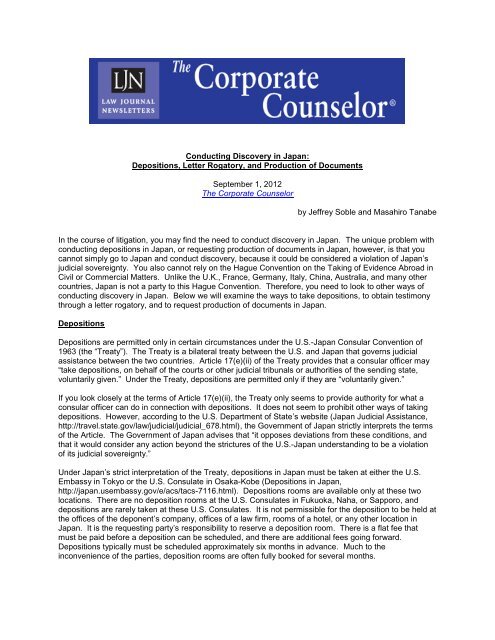Letters Rogatory Explained: Facilitating Legal Teamwork Between Countries

Definition of Letters Rogatory
Letters rogatory are formal demands made by a court in one jurisdiction to a court in one more jurisdiction, seeking aid in obtaining proof or statement for a lawful proceeding. This procedural device is necessary in the context of international law, where legal systems might differ, and cross-border cooperation is necessary. Letters rogatory help with the celebration of information that may be essential for settling cases, especially in circumstances involving intricate global problems.
Normally, these demands emerge in civil, criminal, or management matters where an event needs proof that lies outside the jurisdiction of the asking for court. The letters act as a way to guarantee that the concepts of due procedure are promoted, enabling courts to gain access to evidence that might otherwise remain unattainable due to geographic or lawful barriers.
Making use of letters rogatory is regulated by international treaties, bilateral contracts, or domestic regulations, which delineate the treatments and obligations of the courts involved. It is vital to keep in mind that the execution of such requests is not assured; they rely on the legislations and techniques of the jurisdiction receiving the letter. Therefore, letters rogatory are a pivotal tool for fostering legal cooperation and ensuring justice across borders.
The Process of Issuing Letters Rogatory
Issuing letters rogatory includes an organized procedure that makes sure compliance with both international and residential legal requirements. At first, the requesting event, commonly a court or lawful authority, composes an official demand detailing the nature of the help sought, the evidence or info needed, and the legal basis for the request. This record must be precise to facilitate understanding by the foreign territory.

The next step involves transferring the letters rogatory to the marked foreign authority. This is commonly done through polite channels or global legal support frameworks, ensuring that the request is obtained and recognized by the foreign court. The foreign court after that processes the demand according to its own legal procedures, ultimately replying to the requesting party with the sought-after information or evidence, hence facilitating global lawful collaboration.
Significance in International Regulation
The importance of letters rogatory in international legislation can not be overemphasized, as they serve as a vital system for judicial collaboration throughout boundaries. These formal demands for support in legal matters allow courts in one jurisdiction to look for details, evidence, or the existence of witnesses from another jurisdiction, thereby promoting the administration of justice in multinational instances.
Letters rogatory are especially essential in the context of globalization, where lawful disagreements typically extend several countries. They make it possible for the collection of proof that could or else be unattainable, making sure that lawful process are informed and fair. By fostering partnership between find this judicial systems, letters rogatory help maintain the rule of regulation and advertise shared regard among countries.
Moreover, using letters rogatory demonstrates a commitment to international norms and principles of teamwork, showing the interconnected nature of modern legal methods. It shows the importance of sticking to recognized treatments and treaties, such as the Hague Convention, which gives a structure for these requests - Letters rogatory. Inevitably, letters rogatory enhance the effectiveness of legal processes, ensuring that justice is not hindered by geographical limits
Challenges and Limitations
Despite their importance, letters rogatory face numerous difficulties and limitations that can impede their effectiveness. One key issue is the varying lawful frameworks and procedures across jurisdictions, which can result in misunderstandings and delays in the implementation of requests. Different nations might have distinctive requirements for the credibility of letters rogatory, complicating the process even more.
Furthermore, the typically protracted nature of worldwide lawful teamwork can prevent prompt accessibility to evidence or witnesses. This delay may detrimentally affect ongoing investigations or pop over to this web-site lawful proceedings, specifically in instances requiring immediate action. The absence of sources and training in some jurisdictions can result in inadequate handling of requests, leading to poor or insufficient reactions.
Nations with less official lawful systems might battle to comply with the step-by-step rigor anticipated in letters rogatory. These difficulties require continuous discussion and reform to enhance the efficacy of letters rogatory in legal teamwork.
Instance Studies and Examples

On the other hand, difficulties can arise, as seen in a case entailing a European nation seeking evidence in an ongoing criminal matter from a non-EU nation - Letters rogatory. The process was delayed because of governmental obstacles and varying legal requirements, inevitably impeding the investigation
These instances illustrate that while letters rogatory can promote worldwide participation and quicken lawful process, they additionally highlight the demand for clear interaction and understanding of lawful structures in between countries. Such study highlight the relevance of refining this tool to improve efficiency and efficiency in global lawful matters.
Final Thought
In recap, letters rogatory offer as an important system for assisting in lawful collaboration in between nations, making certain the collection of evidence and testament throughout jurisdictions. Their significance in worldwide regulation can not be overstated, as they promote due procedure and enhance the performance of cross-border lawful process.
Letters rogatory are formal demands made by a court in one territory to a court in an additional jurisdiction, seeking aid in acquiring proof or testament for a legal case. The requesting party, typically a court or legal authority, prepares an official request outlining the nature of the assistance sought, the evidence or details needed, and the lawful basis for the request. The foreign court then processes the request according to its own legal treatments, eventually reacting to the asking for party with the desired details or evidence, hence assisting in worldwide legal participation.
Furthermore, view website the use of letters rogatory shows a commitment to worldwide norms and concepts of cooperation, reflecting the interconnected nature of contemporary legal techniques.International legal teamwork through letters rogatory is not without its real-world ramifications, as highlighted by different instance research studies that highlight both challenges and successes.